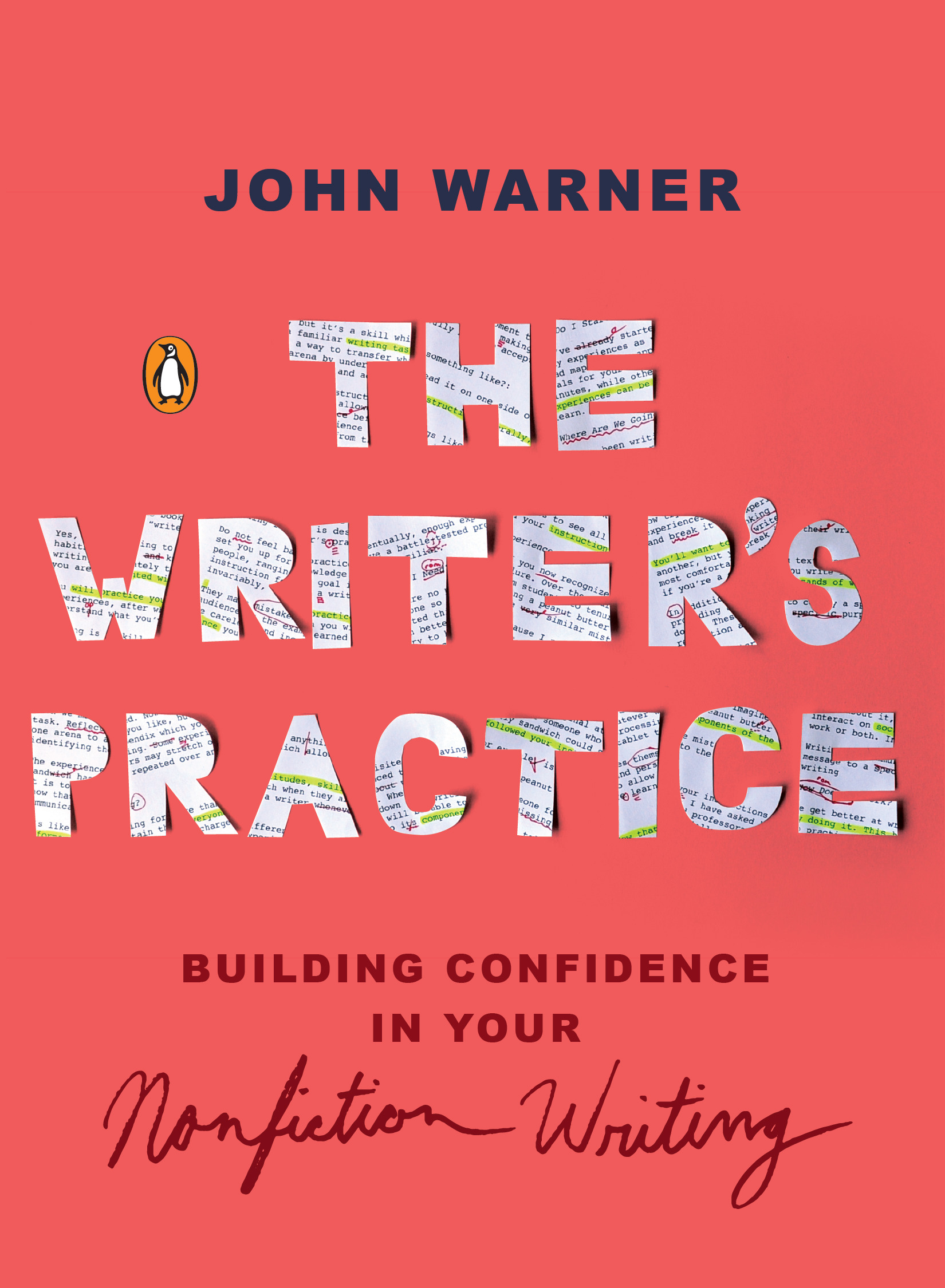You have /5 articles left.
Sign up for a free account or log in.
The first question of the semester I ask students to answer is “Who are you as a writer?”
For this reason, it’s the first “experience” in my imminently released book, The Writer’s Practice: Building Confidence in Your Nonfiction Writing, my attempt to collect all of my philosophies and practices into a series of experiences that I believe will help any writer become more mindful of themselves as a writer in the world, and therefore a more effective writer and communicator.
The goal is to provide a non-prescriptive alternative to a text like They Say/I Saywhile still honoring the kind of critical thinking we’re supposed to value in academia. I want that thinking to be fun, and engaging, and empowering, rather than intimidating, or something performed by rote to please a disembodied authority like a teacher, or worse, a faceless, unknowable “assessor.”
My belief is that a self-awareness of oneself as a writer, and a reflective practice that gives the writer insight into their own growth is a veritable necessity when it comes to building the “writer’s practice”: the skills, attitudes, knowledge, and habits-of-mind of writers.
One of the most alarming signs of distress I’d see among students in my first-year college writing classes was their tendency to define themselves as writers almost entirely according to the grades they’d received in English class in high school. Some would remark that they’d once enjoyed writing, but it seemed those days were gone. Even some of those who received good grades in “English class” often doubted their abilities as “writers.”
Those students had no self-concept as writers, only as students who sometimes perform writing. One of my first goals in class is to get students thinking about themselves as writers in the world, not just students in class so they can embrace my framework of the writer’s practice.
When a box of the finished books arrived, I got a little jolt seeing the Penguin colophon. I have been looking at that little guy on the spines of books since I was a wee child in my mother’s bookstore (The Book Bin), started in my hometown of Northbrook, Illinois when I was a year old. I remember the wire racks of pocket-sized Penguins lining one section of the store. When I got a little older, it was my job at inventory time to count them. Sometimes, I was tasked with ripping the covers off copies which the publisher didn’t want returned, and the store wasn’t going to be able to sell.
Despite being a kid, I did not like this. It felt wrong. Still does.
Deep down, in the recesses of my soul a Penguin paperback is all paperbacks, and now there’s one with my name on it.
This occasion is also meaningful as I give myself the assignment I give my students, asking, “Who am I?” as a writer.
This takes me back to 2011 to a moment where I thought I could turn myself into the writer I thought I wanted to be, my imagine of what I thought “real” writers are.
My novel, The Funny Man, had just been published, coinciding with a move from Greenville, South Carolina to the Charleston area for my wife’s career. I’d left a full-time, but low paid non-tenure track teaching job at Clemson. A couple years earlier, I’d handed off the editorship reins of McSweeney’s Internet Tendencyto Chris Monks, and his excellence in the role made it clear I should never get them back, even if I’d wished to.
My slate was clean, and my novel would be making its way into the world. Maybe this was my chance to be what I thought I’d always wanted to be, a full-time fiction writer.
I was not delusional. I did not think The Funny Manwas going to sell anything other than modestly, but my wife and I had planned so we could live solely on her income, at least for a while. I was free!
I got to work on another novel, applied for a couple of the more prestigious fellowships/retreats available to creative writing types, and fantasized about attending intimate gatherings of likeminded souls as we talked shop, shared tips for saving on taxes, and were just generally awesome in each other’s presences.
I lost my nerve within a couple of weeks, writing the department chair at the College of Charleston to see if they had stray sections of anything laying around. (They did.) I started writing a column under my alter ego, The Biblioracle, for the Chicago Tribune, and when Inside Higher Ed needed a temporary blogger to fill in for my buddy, John Griswold (Oronte Churm), I took it. When the temp gig ended and IHE offered me my own slot, I grabbed that too.
When College of Charleston advertised an opening for a full-time visiting instructor, I lunged for (and got) that as well.
Having time to write that next novel shrank to the occasional weekend and summers. I published a book of stories (Tough Day for the Army) with LSU Press/Yellow Shoe Fiction, but 3/4ths of them had been written before I’d even moved to Charleston.
Eventually, I completed a draft of the novel I’d started after The Funny Manand immediately shelved it as a misfire. I’d been trying to write something with a likable protagonist in reaction to some of the criticisms of the first book, but in trying to make him likeable, I began to loathe him and couldn’t imagine revising it.
Life was busy and good. Charleston is great, and it proved to be a good fit. I love teaching and College of Charleston is a good place to do it. Life off the tenure track is not always peachy, but I was making it work thanks to my steady freelance gigs and well-employed partner.
I would start new fiction projects, grow briefly excited and then see them dribble away under the demands of day-to-day teaching and freelance deadlines, but it never felt bad. I enjoy writing fiction when I enjoy the writing of fiction, if you know what I’m saying. One of the things I was learning about myself as a writer was that I was not one to bang my head against a single problem for an extended period of time. If one problem wasn’t interesting, I would simply jump to another, and come back to the first when it felt right.
It all seemed good, sustainable, interesting and stimulating until a different avenue appeared. College of Charleston would be hiring a tenure-track fiction writer as part of a new MFA program. The dream I thought had died, being a fiction writer with a secure job and the time and space to write novels, suddenly bloomed with possibility.
Don’t ever let anyone insist the inside candidate is a shoe-in for an academic job.
As regular readers know, I did not get the gig.
I was crushed, reader. I had let myself want it desperately, even as I understood that hundreds of other well-qualified people would be applying, and understood also how my strengths and particularly my weaknesses stacked up against theirs.
Suddenly the previous status quo which had seemed good and sustainable wasn’t. I declined renewing the visiting instructorship, stepped down to teaching a single class each semester during the 2016-17 year and tried to figure out what was next.
What was next was mining everything I’d done for the last 20 or so years and putting it into two books, The Writer’s Practice, and published this previous December, Why They Can’t Write: Killing the Five-Paragraph Essay and Other Necessities.
I was conflicted about the sequence of events for quite a while. I thought I’d blown my chance at becoming the writer I was supposed to be. It was almost worse to think that I couldn’t have and wouldn’t have done anything differently. Ultimately, though, the intensity of my new projects pushed those emotions aside.
Even as I was working on those books, writing both in the span of nine months, I was working on a short novel I’m calling Good White People: An American Story. It’s my attempt to process Trump’s America. You should be unsurprised to hear the characters are unlikable, though at the same time I have come to love them because they are so terrible and so lost.
When I finished the novel, I sent it to some trusted readers who thought it looked good and then tried my hand with some people who could possibly get it into print, my agent, some editors I was friendly with, a couple other agents after my existing agent didn’t feel strongly about it.
I was, and am convinced it’s a good book, but I’ve been around long enough to know that being “good” is often not enough. I may have to accept that I haven’t written an “undeniable” book, or that I am the sort of writer from whom a merely good novel is not worth the publisher’s investment.
As the books on writing made their way through the production process and headed towards publication, I realized that I wasn’t feeling super distressed about the fact that I had written a novel that I thought was worthy, but also was likely to remain unpublished. Why wasn’t I crushed?
I thought of my response when we first moved to Charleston, how I fled from even the idea of being a full-time novelist. I thought of my response to not securing the tenure-track job at College of Charleston, and saw that while I loved teaching, I was not upset over not doing what it would take to pursue tenure, the compromises it would require.
I’d been mourning a writer who never existed, frankly one whom I never wanted to truly bring into existence if I was being honest with myself. I was letting other people’s definition of what a writer is, what success looks like, substitute for my own.
So who am I as a writer? I’m a writer who writes things, lots of different things, depending on the day, depending on what’s stuck in my mental craw, depending on who is listening.
Some things more gratifying to the ego, as in some of the early embrace of Why They Can’t Writeby writing teachers who are filling my Twitter feed. Some things are more lucrative, like writing for businesses who have money. (More on that next week.)
I am more like a cobbler than an artist. I get up each morning confronted by what I call in The Writer’s Practice,“writing-related problems.” I’ve largely stopped worrying if I get to embody the notion of an “artist.” Solving those problems occasionally involves true artistry, and even the most seemingly mundane writing-related problems benefit from some measure of creativity.
Being able to solve those problems better than the average bear usually feels like a good day’s work. What else can one wish for?
Answer: Glory, money, attention, influence, respect…should I go on? It is in the writer’s nature to wish for more things, no matter how many things have arrived. Maybe this is just human nature. Guilty as charged.
Who am I as a writer?
I am a writer who writes.
--
I'm also the writer who wrote this book. On sale February 5.






